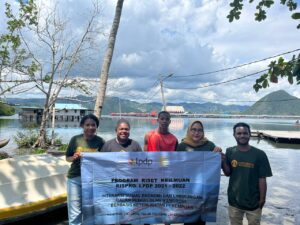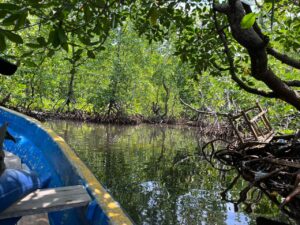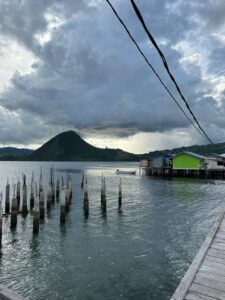
Hutan Perempuan of Enggros Tribe, Papua is a mangrove forest categorized as a customary forest in Youtefa Bay, Jayapura City, Papua Province. This area has a high value of mangrove forest ecosystem services that is managed with customary law (Enggros tribe). In its customary law, the mangrove forest is devoted to the women of the Enggros tribe, through the tradition of Ton or Tonotwiyat or ‘Hutan Perempuan’.
Tonotwiyat is a system of mangrove forest conservation that has existed for many years with the regulation of livelihood areas between men and women. Tonotwiyat tradition makes Enggros women’s relationship with mangroves very close. Women can access the entire mangrove forest area while men are prohibited from entering this area. Men are only allowed to fish in the sea. If there are men who enter Hutan Perempuan area, they will receive customary sanctions from the Tribal Chief.
Indigenous women make a living by collecting shellfish in Hutan Perempuan, selling them in the market, and consuming some of them for their daily meals. In recent years, Hutan Perempuan has experienced environmental degradation due to water pollution and solid waste. Hutan Perempuan is not only a place to earn a living, but also a place of customary rights for Enggros women. Therefore, the problem of Hutan Perempuan cannot be handled only by reducing solid waste or garbage, but also by maintaining the existence and function of Hutan Perempuan ecosystem services so that it continues to be sustainable.

To find solutions to this problem, School of Environmental Sciences of Universitas Indonesia (SIL UI) through the Interaction Research Cluster conducted research collaboration with several parties, including a team from Community Empowerment and Social Environment; Institute for Research and Community Service (LPPM) of Universitas Papua; LPPM of Universitas 17 August 1945 Semarang; as well as Research and Development Center for Environment and Forestry (BP2LHK) of Manokwari and Enggros Village, Papua. The research, conducted from July 2021 to July 2022, connects gender issues and ecosystem service functions based on ecological benefits and economic value.
“The current condition of Hutan Perempuan can be said to be critical. Therefore, sustainable forest management strategies from environmental, economic, and social perspectives need to be known by women and Enggros tribe and the people of Jayapura City so that the forest can continue to be sustainable. As researchers, what we can do now is conduct research with the output of sustainable forest management strategy construction and proposals so that the problems there can be resolved,” said the Head of the Research Team Herdis Herdiansyah.
This research found that the decline in the ecosystem service function of Hutan Perempuan was found in all typologies of ecosystem services. Firstly, inprovisioning services, there is a decrease in the number of bia noor (shellfish) which affects the income of Enggros women. Secondly, inregulating services, water quality in Hutan Perempuan has decreased. Third, inhabitat services, the number of bia noor has decreased because their breeding was blocked by piles of garbage. Meanwhile, incultural and amenities services, Enggros women cannot linger in the forest because the decline in water quality and forest conditions causes itching on the body. This interferes with their customary rights as interaction with other women is limited.
The sustainability of Hutan Perempuan must be maintained by not reducing the area of Hutan Perempuan; eliminating solid waste piles; and reducing sea water pollution in Hutan Perempuan to meet quality standards in accordance with applicable regulations. Sustainability is also supported by regeneration so that young women of Enggros tribe continue to utilize Hutan Perempuan in the future.

This research collaboration was fully supported and sponsored by Ministry of Finance of Indonesia through the RISPRO Program of Education Fund Management Institution (LPDP) in 2021 with the Contract Number 002/E4.1/AK.04.RA/2021. The Research Team would like to thank the Village Chief and Tribal Chief of Enggros Village; the team of Natural Resources Conservation Center (BKSDA) of Papua; Rumah Bakau Jayapura; Imaji Papua (Yulika Anastasia); the Head of the Waste Division of Jayapura Environment Office (Agus Ondi); and Papua Culture and Language Center for supporting this research.



